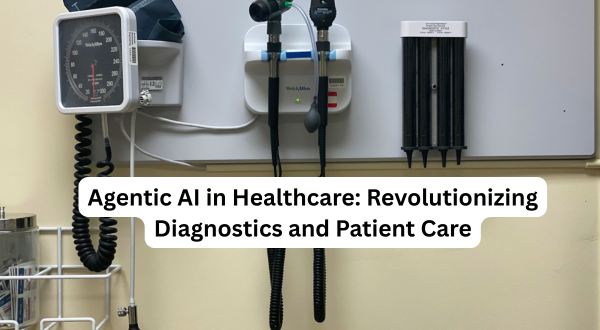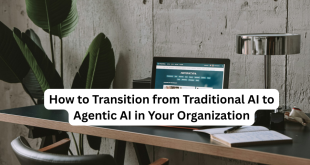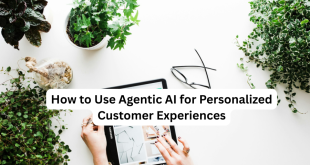The healthcare industry is on the cusp of a transformative revolution, driven by Agentic AI—autonomous artificial intelligence systems capable of making independent decisions and executing tasks with minimal human intervention. Unlike traditional AI, which relies on predefined rules or human prompts, Agentic AI can analyze vast datasets, adapt to new information, and take proactive actions in real time. This technology is reshaping diagnostics, treatment planning, and patient care, promising a future where healthcare is more precise, efficient, and accessible. Let’s explore how Agentic AI is revolutionizing healthcare and what it means for patients and providers.
The Power of Agentic AI in Diagnostics
Accurate and timely diagnostics are the cornerstone of effective healthcare. Agentic AI is enhancing this critical process by acting as an intelligent partner to clinicians. These AI agents can process complex medical data—such as imaging scans, lab results, and patient histories—faster and with greater precision than traditional methods.
For example, Agentic AI systems are being deployed in radiology to detect anomalies in X-rays, MRIs, and CT scans. A 2024 study showed that AI-powered diagnostic tools achieved a 95% accuracy rate in identifying early-stage lung cancer, surpassing human radiologists in speed and consistency. By autonomously cross-referencing imaging data with global medical databases, these agents provide real-time insights, flagging potential issues before they escalate. This capability is especially vital in underserved regions, where access to specialists is limited.
Beyond imaging, Agentic AI is transforming pathology and genomics. AI agents analyze tissue samples or genetic sequences to identify disease markers, enabling early detection of conditions like Alzheimer’s or rare genetic disorders. By continuously learning from new data, these systems refine their diagnostic accuracy, ensuring patients receive tailored interventions sooner.
Personalizing Patient Care with AI Agents
Agentic AI is not just about diagnostics; it’s redefining how care is delivered. These systems act as virtual care coordinators, personalizing treatment plans and monitoring patients in real time. For instance, AI agents integrated into wearable devices can track vital signs—such as heart rate, glucose levels, or oxygen saturation—and adjust treatment recommendations dynamically.
Consider a diabetic patient using a smart insulin pump powered by Agentic AI. The system monitors blood sugar levels, predicts fluctuations based on diet or activity, and autonomously adjusts insulin doses, all while alerting the patient’s doctor to any anomalies. This proactive approach reduces hospital visits and empowers patients to manage chronic conditions effectively.
In mental health, Agentic AI is breaking new ground. AI-driven chatbots, equipped with natural language processing, engage patients in real-time conversations, assess emotional states, and recommend coping strategies or escalate cases to therapists when needed. A 2025 pilot program in the UK demonstrated that such AI agents reduced wait times for mental health support by 40%, improving access for thousands of patients.
Streamlining Hospital Operations
Beyond direct patient care, Agentic AI is optimizing hospital workflows, addressing inefficiencies that burden healthcare systems. AI agents are being used to manage scheduling, predict patient admission rates, and allocate resources like beds or ventilators. During a recent flu season, a hospital in California used an AI agent to forecast patient surges with 90% accuracy, enabling better staff allocation and reducing wait times by 25%.
In surgical settings, Agentic AI assists by coordinating preoperative planning. These systems analyze patient data, recommend optimal surgical approaches, and even guide robotic systems during procedures. For example, Intuitive Surgical’s da Vinci system, enhanced with AI agents, allows for minimally invasive surgeries with greater precision, reducing recovery times and complications.
Addressing Challenges and Ethical Considerations
While the potential of Agentic AI is immense, its adoption comes with challenges. Ensuring data privacy is paramount, as AI agents handle sensitive patient information. Compliance with regulations like HIPAA and GDPR is critical to maintaining trust. Additionally, the autonomy of AI agents raises ethical questions: Who is accountable if an AI-driven diagnosis is incorrect? How do we prevent biases in AI models from affecting care?
To address these, healthcare providers are implementing robust governance frameworks. Transparent algorithms, regular audits, and human oversight ensure that AI agents remain reliable and equitable. For instance, IBM’s Watson Health uses explainable AI to provide clinicians with clear rationales for its recommendations, fostering trust and collaboration.
The Future of Agentic AI in Healthcare
The trajectory of Agentic AI in healthcare is nothing short of revolutionary. By 2028, Gartner predicts that 20% of clinical decisions will involve autonomous AI agents, reducing diagnostic errors and improving patient outcomes. Innovations like AI-driven drug discovery, where agents simulate molecular interactions to develop new therapies, are already accelerating pharmaceutical research. Pfizer reported that its AI agent cut drug development timelines by 30% for a recent antiviral.
For patients, Agentic AI promises greater access to care, especially in remote or resource-scarce areas. Telemedicine platforms powered by AI agents can triage cases, provide preliminary diagnoses, and connect patients with specialists, bridging gaps in global healthcare equity.
Conclusion: A New Era of Healthcare
Agentic AI is not just a technological advancement; it’s a paradigm shift in how we approach health and wellness. By enhancing diagnostics, personalizing care, and streamlining operations, these intelligent systems are empowering clinicians and improving lives. However, their success hinges on addressing ethical and technical challenges to ensure they serve as trusted allies in healthcare.
As we move into 2025, the integration of Agentic AI will continue to accelerate, heralding a future where healthcare is proactive, precise, and patient-centered. Whether you’re a healthcare professional, a patient, or a tech enthusiast, one thing is clear: Agentic AI is transforming the industry, and its impact is only just beginning.
 UBUCH ubuch | Honest Tech Reviews & Tutorials for Everyone
UBUCH ubuch | Honest Tech Reviews & Tutorials for Everyone




